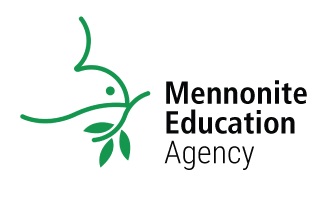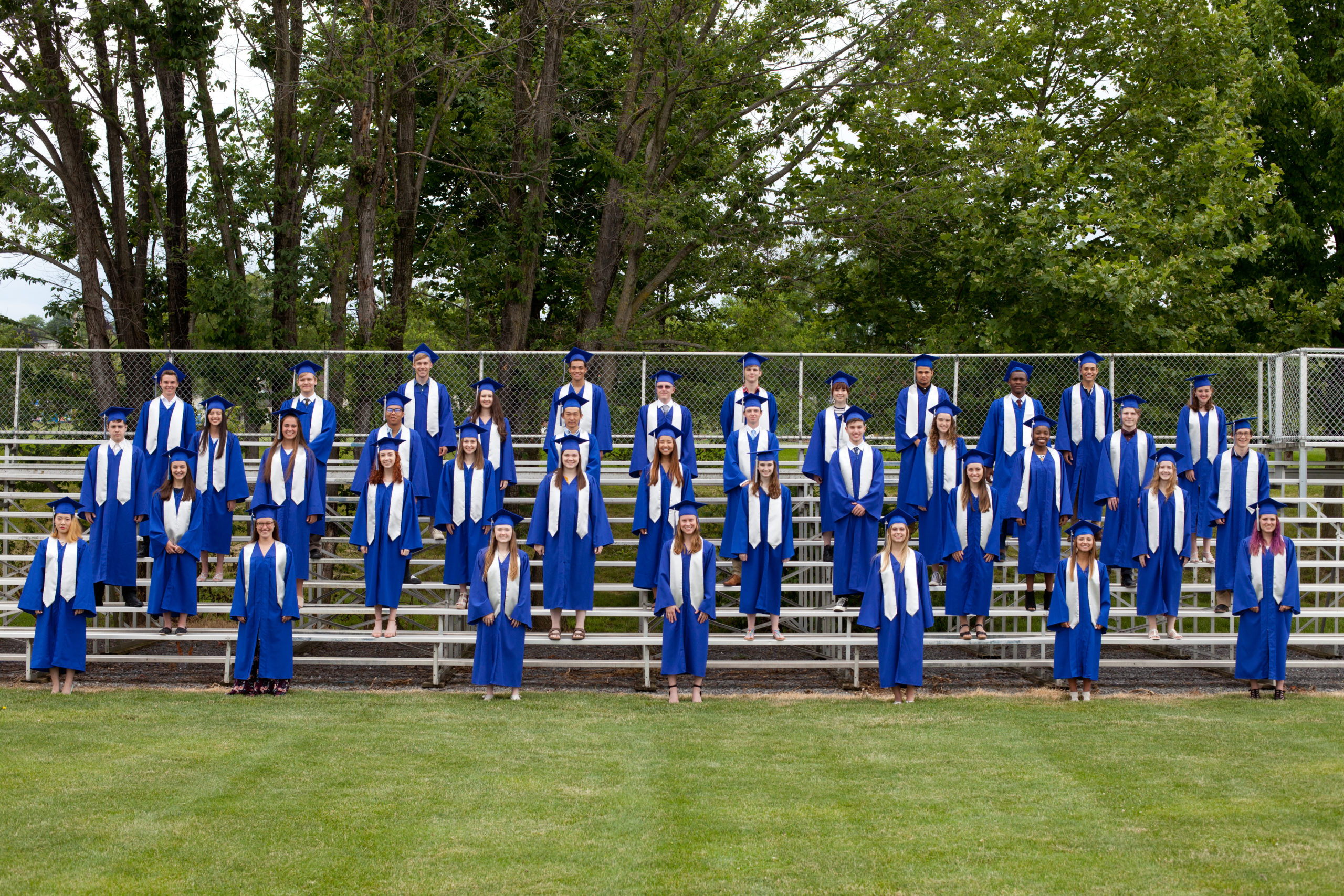
Class of 2020 graduates from Eastern Mennonite School, Harrisonburg, Virginia. Photo by Andrew Gascho.
By Camille Dager for Mennonite Education Agency
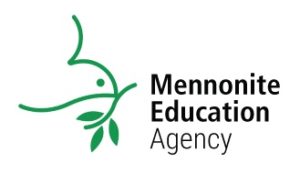 Susan Schultz Huxman, president of Eastern Mennonite University (EMU) in Harrisonburg, Virginia, predicted that spring 2020 would go down in history as “a semester like no other.” The sudden closure of schools, colleges, universities and seminaries amidst the stress and disorientation of a global pandemic had a profound impact on all those involved in education.
Susan Schultz Huxman, president of Eastern Mennonite University (EMU) in Harrisonburg, Virginia, predicted that spring 2020 would go down in history as “a semester like no other.” The sudden closure of schools, colleges, universities and seminaries amidst the stress and disorientation of a global pandemic had a profound impact on all those involved in education.
Carmen Schrock-Hurst, an instructor at EMU, gave voice to the lament that many experienced during this difficult year in a special congregational prayer:
“We remember concerts, recitals and dramas not performed. We remember academic presentations not shared and sporting events not played. We remember an empty Cafeteria… empty dorm rooms and apartments, classrooms and library. We remember semesters abroad that ended abruptly and clinicals and internships radically transformed. We remember what it was like to laugh together and to sing together. We especially mourn the losses of celebration and closure for seniors…the time to share appreciation and goodbyes in person with friends, faculty, and staff [that] was ripped away from you.”
Together, however, they rose to the challenge.
“Mennonite institutions of education are known for high quality academic programs, and I am pleased to say this quality was not lost as the schools embraced virtual learning,” said Tom Stuckey, interim executive director of Mennonite Education Agency. “Faculty, staff, administrators, students and parents responded quickly to find helpful ways to keep academics front and center and to stay in touch with and support each student.”
Now, as schools begin the difficult work of preparing for a new school year with the ongoing challenges of COVID-19, hope can be found in how Mennonite schools responded to the pandemic through their unique emphasis on peace, reconciliation and service.
Hope was found in positivity.
Rachel Miller, sophomore at Hesston College, Hesston, Kansas, acknowledged the painful loss of in-person community, noting that college is not just a place. “It’s the students, faculty and staff. I miss the feeling of being in a tight-knit group and always having someone there for me when I need them,” she said, adding, “but we’re still finding ways to connect, and I appreciate that.”
Hope was found in brave leadership.
Annette Bergstresser of Anabaptist Mennonite Biblical Seminary (AMBS), Elkhart, Indiana, notes that “the pandemic presented unique opportunities to experiment with and model leadership in a time of crisis.”
While administrators grappled with restructuring their institutions, implementing safety plans and planning for an uncertain future, educators raced to adapt lesson plans, curricula and teaching methods.
At AMBS, faculty members asked students to reflect on the pandemic from theological, peacebuilding and ministerial perspectives. For example, Janna Hunter-Bowman, Ph.D., assistant professor of peace studies and Christian social ethics, changed her Religion and Peace Processes course to include examination of Christians’ differing theological approaches in response to the pandemic, while Dan Schrock, D.Min., adapted his Spiritual Guidance Practicum, so students could learn to offer spiritual direction by video call as well as in person.
Educators at Mennonite schools also worked hard to nurture students emotionally and spiritually, providing students and their families with resources, online worship and chapel services, Zoom check-in times and ongoing encouragement.
“I want students to come away with a feeling of warmth and closeness during this time, not a feeling of stress or anxiety,” said Heidi Byler, third grade teacher at Eastern Mennonite School, Harrisonburg, Virginia, in a message to parents. “Our goal is to keep moving, not to keep up, and my biggest goal for your kids is a feeling of safety, comfort, and connection during this strange time. All else matters much less.”
Hope was found in family relationships.
For most students, the shift to online learning meant more time at home.
“A key distinctive of our Mennonite Schools Council schools is our close partnership with parents and the church in our educational process,” said Dr. Conrad Swartzentruber, executive committee chair of the Mennonite Schools Council and superintendent of Dock Mennonite Academy, Lansdale, Pennsylvania. “This partnership was never more evident, essential and appreciated than when our campuses closed. Schools quickly prepared to keep students engaged in the learning process, physically away from our greatest resource, our teachers. At the same time, parents abruptly needed to care for their children at home while helping to facilitate online learning.”
Students seemed to enjoy spending extra time with their families, as Stacey Farran, orchestra teacher at Bethany Christian Schools, Goshen, Indiana, discovered when she asked students where they were finding joy in their new routines. They responded:
“It’s nice to have my brother home from college.”
“Playing lots of board and card games with my family.”
“I am able to spend time with my mom doing projects, helping with work, and baking/cooking.”
Teachers also saw the value in having students enjoying their time at home. Bethany Gibbs, fourth grade teacher at Eastern Mennonite School, encouraged parents, saying, “There are so many other ways they can learn besides just doing assignments. Playing a game, building with Legos, cooking, listening to music, doing yard work – it’s all teaching them something!”
Hope was found in reimagined community and mutual aid.
While COVID-19 made “social distancing” household words, Mennonite schools broke down the walls of separation by imagining news ways to connect and lean into their value of community.
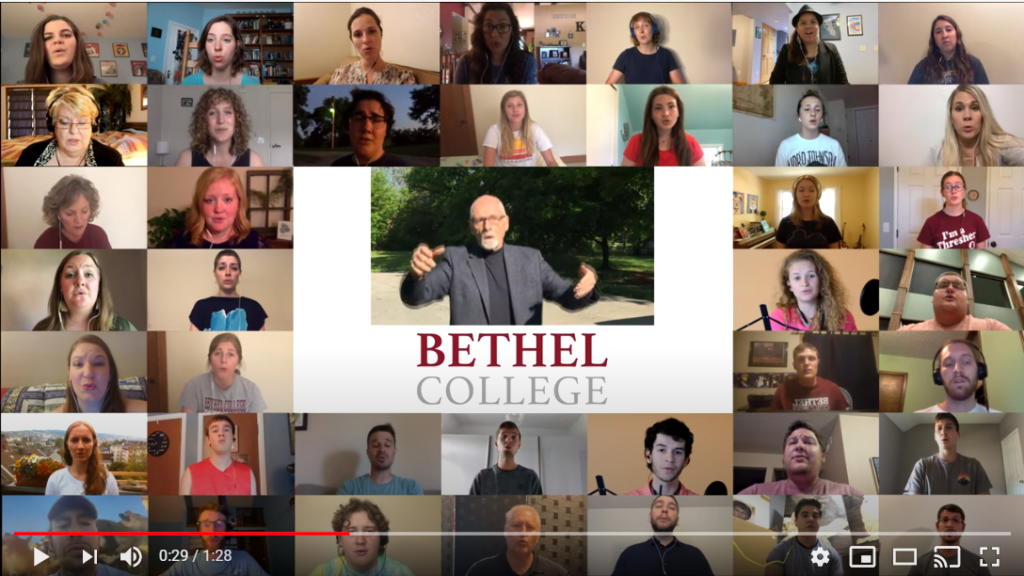
Alumni and current members of the Bethel College Concert Choir came together (virtually) for a performance of “The Lord Bless You and Keep You” by Peter Lutkin.
In the early weeks of the pandemic, 100 Eastern Mennonite School students, parents, faculty and alumni from as far away as Romania and Vietnam joined their voices in a virtual choir to share a message of hope through John L. Bell’s composition, “Don’t Be Afraid.” Other virtual choirs, such as the Bethany Christian Concert Choir, also sang out their encouragement virtually.
At AMBS, a student-led initiative created a mutual aid fund to enable people to share their stimulus checks with students in need.

Jennifer Rhodes visiting her students.
Teachers reached out to students in new ways, such as Jennifer Rhodes, a second-grade teacher at Quakertown Christian School, Quakertown, Pennsylvania, who visited her students at their homes – from a safe distance, of course.
Out of concern for the safety of its students and the community, Lancaster Mennonite School, Lancaster, Pennsylvania, canceled two annual in-person events and replaced them with #LoveBeyondDistances Day, a day of service and giving. Students responded in creative and heartfelt ways: delivering food to neighbors, writing cards to their postal carriers and drawing messages of encouragement on their windows and sidewalks. The Christ-like acts and joy spread virally, with more than 41,000 views by people in the Lancaster community on the school’s social media platforms, according to Aubrey Kreider, director of marketing and communications.
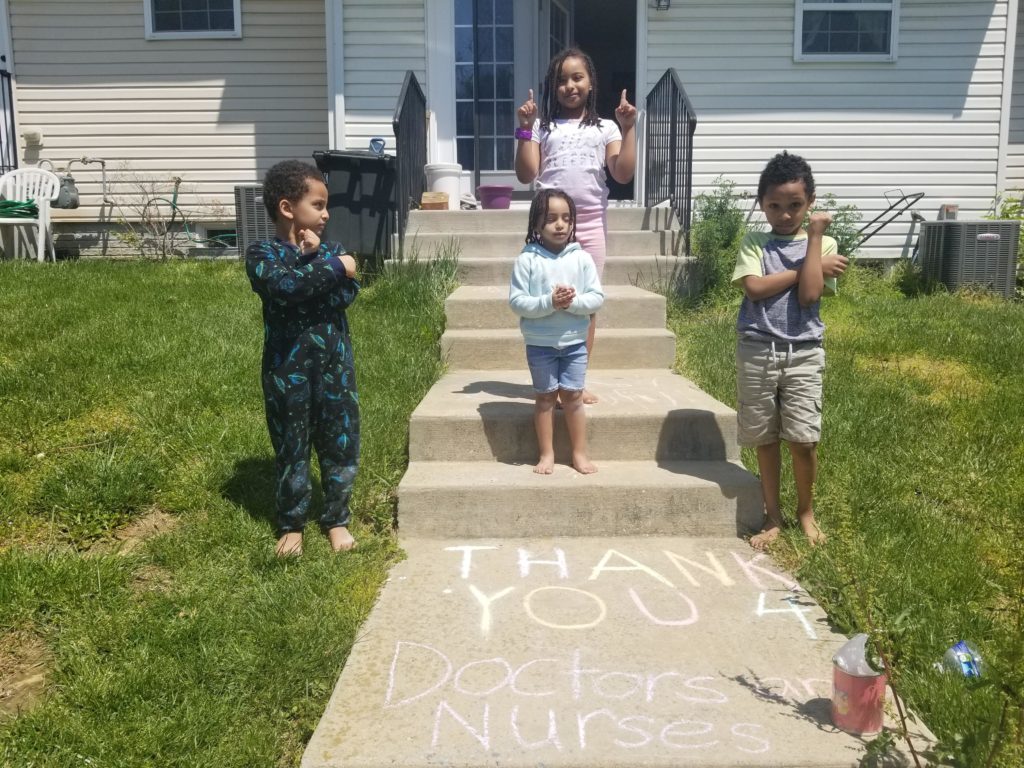
The Kabeta family participated in Lancaster Mennonite School’s #LoveBeyondDistancesDay.
EMU’s nursing program was deeply impacted when community clinical sites closed in response to the pandemic, limiting opportunities for students seeking clinical hours. Professor Kate Clark worked with the Virginia Department of Health to find volunteer opportunities with the department’s regional hotline. One of the volunteers, senior Emily Travis said the experience was “an amazing, once-in-a-lifetime opportunity [to help] people who are looking to do the right thing and look out for others as well.”
For Lezha Academic Center in Albania, COVID-19 came on the heels of the devastating November 2019 earthquake. The region was left crippled with little or no medical care or sanitation. As missionaries in the Balkins left the region this spring, school founders Dini and Klementina Shahini of Virginia Mennonite Missions remained committed to serving in Lezha. “Dini and I decided to stay here, not only to supervise online classes but also to maintain an encouraging presence in the community.”
Hope was found in God’s presence.
Benny Thawng, a student at Hesston College, said, “I spent my time building a closer relationship with God because that is what kept me going.”
At Kraybill Mennonite School, Mount Joy, Pennsylvania, the school was grieving the loss of long-time community member Fred Garber, a former student, board member, patron and pastor, who passed away in March, as well as the cancelation of the school’s annual Mother’s Day auction fundraiser. Trying to make the best of the situation, the faculty hosted a drive-through chicken barbecue.
“As we were preparing, we checked the mail and there was a check from Everence with a donation in Fred’s memory,” said MJ Smith, principal. “The fact that it came on our scheduled auction date was an affirmation of the providence of the Lord. We celebrated this gift as a sign from God that Fred was, indeed, with us. What a blessing!”
And hope is found in moving forward
At the Mennonite Educators Conference earlier this year, Peter Wiens, assistant professor of teacher education at the University of Nevada, Las Vegas, pointed out that, “The intersection of faith and education makes Mennonite schools different.”
This is evident in the ways that MEA schools responded to the challenges of the pandemic, as well as the way they are now preparing for a fall where they will continue to ground education in the Anabaptist values of faith, community and peacebuilding. In her virtual commencement address to graduates, EMU President Susan Schultz Huxman spoke words of encouragement that highlight the hopes of Mennonite educational institutions as they look to the future:


